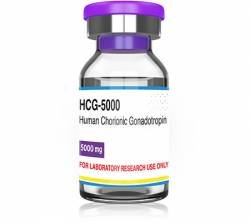HCG-5000iu
$59.40
- Ingredient:Human Chorionic Gonadotropin
- Manufacturer:Pharmaqo Labs
- Brand Name:Pregnyl
HCG is a hormone that is naturally produced by the female placenta during a normal pregnancy. This medicine’s action is highly similar to luteinizing hormone (LH), because this hormone is known to be able to cause ovulation. If it is combined with other medicines and drugs, HCG is highly effective in helping female patients become pregnant. This drug can also help males patients that are suffering from fertility issues (a treatment with this medicine usually enables such cases to produce a higher amount of testosterone).
HCG is a popular medicine that is regularly prescribed to female patients as part of a regimen that is supposed to induce: Ovulation induction in subfertility that is usually triggered by impaired follicle-ripening or by anovulation. – Luteal phase support. Follicle preparation for puncture in controlled ovarian hyperstimulation programs (this usually occurs in the case of medically assisted reproductive methods and techniques).
HCG is a medicine that is regularly prescribed to male patients because of its ability to induce Hypogonadotrophic hypogonadism. Some patients who were suffering from idiopathic dysspermias have positively responded to a treatment with this medicine. Delayed puberty which is regularly associated with an insufficient function of the gonadotrophic pituitary glands. Cryptorchidism, (not the one that is triggered by an abnormal anatomical obstruction).
HCG is a popular medicine that helps both male and female patients deal with infertility. However, this medicine can also be used for some other purposes (to treat or to prevent some other medical conditions) that have not been listed here.
In the case of female patients who want to be treated with HCG: Since infertile female patients who undergo medically assisted reproduction (especially those who need in vitro fertilization), are known to often be suffering from tubal abnormalities, after a treatment with this drug they might experience much more ectopic pregnancies. This is why early ultrasound confirmation at the beginning of a pregnancy (to see whether the pregnancy is intrauterine or not) is crucial. Pregnancies who have occurred after a treatment with this medicine are submitted to a higher risk of multiplets. Female patients who have thrombosis, severe obesity or thrombophilia should not be prescribed this medicine as they have a higher risk of arterial or venous thromboembolic events after or during a treatment with HCG. Female patients who have been treated with this medicine are usually more prone to pregnancy losses.
Only logged in customers who have purchased this product may leave a review.












Reviews
There are no reviews yet.